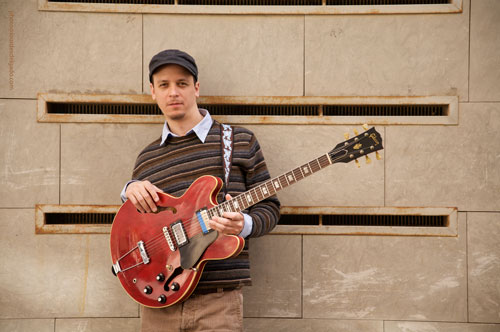Music Review: Kurt Rosenwinkel & Orquestra de Jazz de Montesinhos (OJM) – A Temporary Relationship
Kurt Rosenwinkel’s compositional style is undeniably ingenious and appealing; it is strong on tuneful, singable lines that move logically from chord to chord and occasionally lead listeners to unexpected places.
 Our Secret World. Wommusic CD; $15.99 via Amazon; $14.99 [ + shipping] through the musician’s website. It’s also for sale as a download through iTunes.
Our Secret World. Wommusic CD; $15.99 via Amazon; $14.99 [ + shipping] through the musician’s website. It’s also for sale as a download through iTunes.
Reviewed by Steve Elman.
A little affair on the side?
So far, that’s what the Rosenwinkel / OJM combination seems to be—a refreshing break for the guitarist from his small-group work and a chance for the Portuguese jazz orchestra to hitch its wagon to a star.
Their joint international tour, supporting the newly-issued Our Secret World is winding down now. It passed through Boston on September 15, as the first concert in Berklee’s BeanTown Jazz Festival, at the Performance Center. It moves to DC (Lisner Auditorium) on October 1 and concludes in Portugal with concerts in Porto (October 3) and Lisbon (October 4).
The CD is an unequal collaboration, and the Boston concert did not seek to extend the relationship in any significant way. This is not to denigrate the essence of the music, which consists entirely of strongly-played, large-jazz-band showcases for Rosenwinkel’s virtuoso soloing.
All of the tunes are older Rosenwinkel compositions recast in new and sometimes surprising colors by OJM leaders Pedro Guedes and Carlos Azevedo with two more adventurous charts arranged by Ohad Talmor. Rosenwinkel’s fans will readily recognize “The Cloister” (heard on his CD Deep Song); “Use of Light” (exposed on Deep Song as well as The Next Step); “Zhivago” (from The Next Step); “Our Secret World” (from Heartcore) and “Dream of the Old” (from The Enemies of Energy). They will delight (as the Berklee crowd did) in the ample opportunities he has here to show off his remarkable technique and his mastery of the hardware.
Unfortunately, the CD is (and the concert was) monochromatic. Rosenwinkel’s compositional style is undeniably ingenious and appealing; it is strong on tuneful, singable lines that move logically from chord to chord and occasionally lead listeners to unexpected places. One at a time, each of these pieces provides a lot of enjoyment. But as a group, they say the same things over and over again. If you’re looking for Kurt to break new ground or to explore something more profound than he has in his past work, you may be disappointed.
Let us count the factors conspiring against complete artistic satisfaction here. For one, the leaders of the Orquestra de Jazz de Montesinhos seem to be so pleased to be working with a major jazz talent that they find it hard to go toe-to-toe with him as equals. Pedro Guedes, who conducted the band in Boston, was frank about his admiration for Rosenwinkel and the honor he felt in being on stage with him. The gee-whiz factor was a bit disconcerting—Rosenwinkel is a very adept artist, but he would probably be the first to say that he has a lot more growing to do before he deserves this much adulation.
Maybe modesty is one reason that so few of the band’s players are given solos. Only three of the saxophonists stepped out at Berklee (and only one is heard on the CD). Even arranger Carlos Azevedo, who played piano at Berklee, was limited to some mood music as introduction to and transition within “I Need to Know.” It would have been nice to hear what other members of the band might have to say or to hear them trade licks with Rosenwinkel.
Another concern is that the OJM isn’t exactly breaking new ground in jazz scoring. The language of the arrangements is part of a fine tradition, one that includes the work of Gerald Wilson, Gerry Mulligan’s Concert Jazz Band, Thad Jones, and Bob Brookmeyer. The sections give us rich masses of sound, but the feel is a bit blocky and stiff. I hoped for a little influence of Gil Evans’s work—after all, the OJM has performed the “Sketches of Spain” scores, so they know Evans’s stuff from the inside out.
The essential idea of the arrangements—juxtaposing Rosenwinkel’s orchestral approach to his instrument with an actual orchestra—is a good one, and it works a lot of the time, but the floating, indeterminate qualities of the late Evans band would have given the guitarist some more open forms to explore.
(There are a few pleasing exceptions to my cavils: the beginning of Azevedo’s arrangement of “I Need to Know, where there is a kind of group tremolo, piano over winds; Talmor’s arrangement of “Path of the Heart” on the CD, with some open harmonies à la George Russell; and the close of Guedes’s arrangement of “Use of Light,” where lead trumpeter Nick Marchione hits his quarter-tones right on the button—and he did it just as well in concert as he did on the CD. Arguably, this latter touch is still part of the tradition noted above [pace Don Ellis], but it was bracing and effective.)
 Perhaps it seems petty to carp about time signatures, but six of the eight compositions performed at Berklee (including “I Need to Know” and “Déjà Vu,” which are not on the CD) were in permutations of triple time, as is most of the CD. Drummer Marcos Cavaleiro is completely comfortable in this territory, and in fact he’s a bit springier here than he is playing straight four, but the prevalence of 3/4 and 6/8 doesn’t make for a well-balanced program.
Perhaps it seems petty to carp about time signatures, but six of the eight compositions performed at Berklee (including “I Need to Know” and “Déjà Vu,” which are not on the CD) were in permutations of triple time, as is most of the CD. Drummer Marcos Cavaleiro is completely comfortable in this territory, and in fact he’s a bit springier here than he is playing straight four, but the prevalence of 3/4 and 6/8 doesn’t make for a well-balanced program.
I have one more quibble; even though this is a Portuguese orchestra, I heard not a hint of that magic, Moorish-Iberian color that Gil Evans used with Miles Davis. Was it the arrangers’ reluctance to challenge Rosenwinkel or the guitarist’s veto that prevented them from including a single, new, original composition with a distinctly Portuguese flavor, maybe something that drew from the fado tradition?
Enough. Let’s end with the good stuff. Rosenwinkel has a great solo on the CD’s version of “Zhivago,” and in concert he made it even better with a dramatic and powerful statement that included a breathtakingly dissonant long run near the end. “Déjà Vu” was a welcome addition to the CD material; it’s a lovely line that recalls Bobby Hutcherson’s “Little B’s Poem,” especially in a group of ascending chords in the bridge, and the band made the most of it. And the Methenyish finish to “Dream of the Old” translates very well to a large ensemble, on stage and on record.
For his part, Rosenwinkel has expressed surprise and pleasure that the Portuguese arrangers would choose his compositions and lavish so much attention on them, even if he betrayed a hint of noblesse oblige in doing so. Perhaps he knows in his heart that this is not exactly a partnership, but more of a fling.



[…] that review with this one by Steve Elman @ The Arts Fuse. Everybody are entitled to their opinion, and we appreciate the fact […]
In his review, Steve Elman waits 13 paragraphs to finally give 1 of praise, and this is some of the best modern jazz being played.
Why??
I agree that the OJM soloists should be given the spotlight too.
I disagree on most of the other criticisms, especially about the Portuguese flavor thing. I would say a fair dose of that undefinable flavor is present. Regarding the fado tradition, would the reviewer want to hear Rosenwinkel playing some country western licks?
OJM stands for Orquestra de Jazz de MATOSINHOS, not “Montesinhos”!
Matosinhos is a city neighbour to Porto; Montesinho (singular) is the name of a national park in north-east Portugal,
I love how much this cat’s opinion doesn’t matter at all. Kurt, keep doing your thing!!! Much love to you and OJM. Beautiful stuff, and I’m so happy it’s in the world.